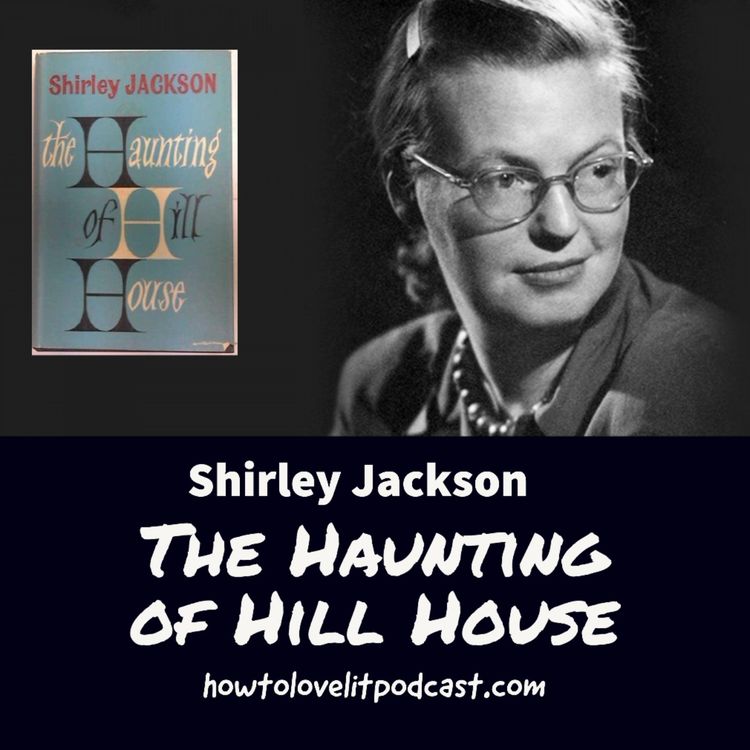Share

How To Love Lit Podcast
Shirley Jackson || The Lottery ||Her Most Famous Short Story!
Shirley Jackson - The Lottery - Her Most Famous Short Story!
Hi, I’m Christy Shriver, and we’re here to discuss books that have changed the world and have changed us.
And I’m Garry Shriver and this is the How to love Lit Podcast. Today we are finishing up our series on Shirley Jackson. Last week we concluded our discussion of her most famous book, the one that inspired the Netflix series by the same name The Haunting of Hill House. Today we are going to read the short story that made her a household name, “The Lottery.”
It has had its share of movie inspiration. Anyone who has seen the opening of The Hunger Games would not be shocked at the plot of “The Lottery.” It’s inspired a bunch of other stories and movies besides that one; I think you mentioned the Stephen King one last week. I’m sure there are way more than that if we sat here and thought about it.
True, and maybe I shouldn’t have been, but I was actually surprised as to how scandalous this story was when it was first published. If we’re talking solely about violence, by today’s standards, it’s mild. There is no blood or gore, it’s definitely no Squid Games.
I agree- and I believe that is why this story- so deceptively simple and relatively tame- is actually taught in the eight grade in many school systems. It’s disturbing for reasons beyond the fact that someone is killed at the end- kiiling a main character is just par for the course in a standard English curriculum- in fact, that’s the big joke among English teachers- we don’t teach a story if we don’t kill someone at the end. “The Lottery” reads and feels so simple. And it is…so why the sensation?
Let’s talk about the sensation, it’s definitely worth noticing how big a stir it actually created.
For starters, the story generated more negative letters and subscription cancellations than anything the New Yorker had ever published. Jackson herself received over 300 letters just the summer it was published. In her own words she said this, “I can count only 13 that spoke kindly to me.”
I want to point out that her mother, the ever-inspiring Geraldine could be counted on for a comment. She wrote her daughter with this to say, “Dad and I did not care at all for your story…it does seem, dear, that this gloomy kind of story is what all you young people think about these days. Why don’t you write something to cheer people up?”
Dear Ole’ Geraldine- at least she’s consistent. But Jackson refused to explain the meaning of the story. She did once tell a journalist, “I suppose I hoped, by setting a particularly brutal rite in the present and in my own village, to shock the readers with a graphic demonstration of the pointless violence and general inhumanity of their own lives, but I gather that in some cases the mind just rebels. The number of people who expected Mrs. Hutchinson to win a Bendix washer at the end would amaze you.”
Ha! Well, I don’t know how pointless violence and general inhumanity could have surprised anyone in 1948 when it was published. That was right after world war 2, especially the United States, had to stare the reality in the face that we had stood by and turned a blind eye for almost a decade to the atrocities committed by Hitler, and there was no one more cultured or sophisticated than the German people.
I guess that’s true, but of course…for Americans that was always…over there…we, self-righteously could always claim we were not capable of such things...
we after all were the victorious winners in that struggle between good and evil. And yet, Jackson’s simple story does seem to be pointing an accusing finger at someone.
Yes, I totally think it does, and I do want us to take a different direction than many people who read this story. At first pass, and this is how I’ve most often heard this story discussed, this is a story that rails against tradition, against not questioning authority, specifically religious authority, against patriarchy…all very easy things to attack and very common in the American canon.
Well, not just in the arena of literature either. We’ve been attacking cultural norms in one form or another since American invented baseball as its own American sports ritual over the sport of the British Empire- football or better known here as soccer.
HA! I guess that’s true. We also have a way higher tolerance for gore than this story evokes- I mean we were comfortable with the headless horseman and the tell-tale heart. There was something personal about the Lottery that went beyond attacking traditions or killing an innocent victim. I also don’t think many of us would cancel our subscription to our favorite media streaming service (which would be the modern day equivalent), or take the trouble to dig up someone’s personal address and write them a personal letter if we did not feel personally attacked. “The Lottery” got under people’s skins because it was personal. So, that’s the question I want to ask? If this story is about pointless violence and general inhumanity, and if I’m offended because I feel personally accused, how?
So, let’s start- Christy, we talked about if we should read the entire story and then discuss it or if we should stop and start. We’ve decided to stop and start, but hopefully we won’t stop and start too much to be confusing, but just enough to be helpful- a difficult balance to strike.
True- Garry- we may fail, but let’s give it a go. Let’s start with the first three paragraphs and then we’ll interrupt.
Paragraphs 1-3
What are your thoughts?
Well, the thing that strikes me here is tone. Look at the imagery and word choice- it’s summer, there is fresh warmth- there are flowers blooming- there’s not just grass there’s richly green grass- this is the language of birth and beauty. There is also a deliberate attempt to characterize these people as organized and civilized- the lottery is annual, it takes less than two hours, they eat a noon dinner- the children don’t gather, they assemble- assemble is a formal word. There is a reference to school. They are being instructed and civilized so to speak deliberately – the word “liberty” is thrown around here. And yet what are they doing, they are stuffing their pockets full of stones- even the very small children. They assemble as family units, the very bedrock of civilization across time and culture- they stand together- united- and for a purpose that is upsetting to no one.
Let’s read the next four paragraphs and learn about the culture and traditions of this place.
Next four paragraphs
One funny thing that Jackson does in this story is play around with names. The names are all carefully selected- look at who’s conducting all of this, a man by the name of Summers- such a happy name associated with youth, strength, growth, life, all of it. But look at the other guy- Mr. Graves- he also is responsible for making up the slips of paper and putting the names in this black box. It’s a pun- a grave is a place where we put a dead body. It also means serious- like if you are in grave danger. The black box one time spent a year in Mr. Graves barn, but that’s not the only place it lives. He is not solely responsible for this black box. It’s spent a year in the post office and also in a grocery store owned by Mr. Martin.
Another thing that people have pointed to is all the possible symbolism in this story. It does seem that this box is a symbol, the three-legged stool is a symbol, the black mark is a symbol, even the stones are symbols. But for what? We should always annotate and follow the symbols, but I usually withhold judgement on what they mean until I’ve had time to think about the story as a whole.
And we’ve got more names- a lot of names actually. One that showed up earlier, but we didn’t address is name Delacroix- we’re even told the correct pronunciation of this name-
Dela-Croix- as in French for of the Cross
Yep- except they mispronounce it- they don’t say Delacroix like you’re supposed to say it- they say delacroy- a corruption of the original. And that sets up for me another a pattern that I see as you read through all these traditions. Traditions are not fixed- like people think they are.
No, They evolve like everything else on planet earth. We keep what we want and discard what we don’t like. On my wall, I have a poster that says all behavior is goal- directed- and that goes for entire cultures as well. No matter what we say, our behaviors speak for us- and they are all goal-directed. This is true for traditions as well- be it religious, ethical, or civic.
Jackson is very ambiguous about her relationship with religion here. I want to point out that this is not a religious ceremony, and she could have very easily and understandably made it one. Mr. Summers could have been Pastor Summers or Father Summers or Rabbi Summers, but he’s not any of these, he’s a businessman. I want to suggest what I think here about-that three legged stool- I do think it represents what holds up society in general- three aspects of societal authority or control- religious, civic and commercial- these three legs hold up the black box. They are working together, but none is running the show exclusively.
Well, if we’re going to guess at symbolism, I want to make a suggestion of my own.
Oh-okay- what do you want to suggest?
That black box. It’s power, it’s control. It’s black because fear controls. It’s dynamic in that it moves. It evolves over time, as power does. It’s cloaked in secrecy, it hides behind tradition, but we see that that isn’t necessarily true- they went from chips to paper when they wanted to. What they wanted to uphold was the black box of power. I also want to point out that somehow Jackson subtly connects her ritual with this black box and three-legged stool to the harvest, which I found to be a particularly interesting connection. It’s a link to survival and it’s at the heart of human existence. The ancient Athenians, the Aztecs, the Incans on this side of the world just to name a few, but many cultures have connected human sacrifice to crop fertility. In fact, and this may be a point of irony, if you just look across human history from the Egyptians to the Chinese, what we see is human sacrifice correlates directly with a rise in a more sophisticated culture and social stratification than the other way around, contrary to what Old Man Warner suggests.
What do you mean by that?
I mean that we can see, historically, as societies got more sophisticated and organized, we saw more and more links to human sacrifice.
Well You’re right That is counter-intuitive- you would think it would be just the opposite. Of course, closer to home, in the Judeo-Christian tradition, which is what Jackson was most familiar with and what is reflected most obviously in her story, there is a very deep tradition of sacrifice but not human. This story is not a direct attack on Christianity by the way, but there is a lot of Christian imagery here- not just with the name Delacroix or delacroy. There is also the connection with publicly sanctioned and even religiously sanctioned public stonings. This is a ritual we see in the Old Testaman of the Bible, and one we see Jesus referencing directly in the New Testament in the Bible. There is a particular story, one of the more famous stories in the New Testament from the 8th chapter of Saint John where a group of men want to stone a woman because they caught her in the act of adultery. They take her outside; they all gather stones and are ready to murder her when Jesus intervenes. He takes a stick and starts writing something in the sand which we are never told what they are, but he famously says, “He who is without sin cast the first stone.” The men slowly but surely as they read whatever he was writing, dropped their stones and went home. Of course, we don’t know what he wrote, I like to think it was the names of their paramours, but that’s just me enjoying the irony. The story ends with Jesus looking at the woman and asking where her accusers had gone because by that point there were none left.
So, you see that story connecting here-
Yep- I do. There are more Christian references too- Mrs. Adams, that’s the name of the first man. There is an Eva- and then Old man Warner- his name isn’t Biblical but there’s a biblical connection. Again, back to Jesus in the New Testament. These Biblical references, btw, are not obscure- these are super-famous passages that every red-blooded American in 1950 would know. In the New Testament there’s another story where a follower of Jesus asks Jesus how many times a person was responsible for forgiving another person- the follower offered a suggestion- he said, should we forgive a person seven times- something he finds to be generous- to which Jesus responded- you should forgive a person 70 times 7 – I think what is important about Old Man Warner is not his name but his age- and the link to this archetypal number.
What’s the connection- I don’t think this story is talking about adultery or forgiveness, is it?
Not directly, it’s talking about values and core values and hypocrisy for sure- and we’ll flesh it out when we get to the end, but what I want to point out- is that people have somehow found their value in surviving this tradition. Mr. Warner brags that he’s survived 77 of these without getting picked- his importance comes from this. Warner also makes a claim that is literally a great example of a post hoc fallacy- an error in logic which you believe that just because something comes before something it means that thing necessarily causes it- he is literally saying that the harvest comes as a direct result of the lottery. He doesn’t invoke any diety for believing this- he just throws it out there. He’s resistant to change because he’s validated by this social order.
Well, I can see why lot’s people think this story is about accepting things just because they have always been done. Warner clearly makes that argument.
Of course, that’s obvious and there- it’s just not the heart of the story. I want to bring up one more name before we finish and get to the punch line. The name Tessie Hutchinson- if we look to history there is one Hutchinson woman who stands out- Anne Hutchinson- she showed up in chapter 1 of the Scarlet Letter too- btw- which has a connected theme to this story-
but anyway- tell us who this person is- for those less familiar with early American history.
Anne Hutchinson- we’re going way back now- she was born in 1591- she was banished to the colony of Rhode Island after being excommunicated from Massachusetts bay colony for teaching among other things that women should read and be in leadership but mostly her teachings about the Bible were considered heretical. She ended up being murdered by Indians in 1643. It’s a sad ending. She was definitely cast out of the group.
So, let’s finish reading the story, and see where we land with all these ideas swirling around in our heads.
Finish the story
Well, Mrs. Hutchinson doesn’t win a Bendix washer. You know the psychologist Carl Jung, as you know I like his work, stated that even more or less civilized people remain inwardly primitive. We don’t like thinking this, so we can justify with this “mass psyche”. The group becomes the hypnotic focus of fascination and we can allow ourselves to fall into some sort of spell.- that’s the word he used. The group experience lowers the level of consciousness like the psyche of an animal so we don’t have to take responsibility for our actions on an individual level. It’s not a murder if it’s a ritual. How could it be? It’s sanctioned by the group.
And yet, it is murder, isn’t. And where I see all of Jackson’s ambiguities emerge. Her story can be interpreted so many different ways. For one thing, no one sees any moral conflict. Any psychological explanation for that. I mean they do this every year.
Talk aboou the Milgram experiment
It’s a nameless village, full of tradition, likely corruption, so civilized, so warm, the people were so nice to each other…all the way until Mrs. Delacroix picks up the largest stone she could find with which to pelt her good friend Mrs. Hutchinson.
Jackson downplayed her story. In an essay she wrote about it she had this to say, “I had written the story three weeks before being published. The idea had come to me while I was pushing my daughter up the hill in her stroller- it was as I say, a warm morning, and the hill was steep, and beside my daughter, the stroller held the day’s groceries- and perhaps the effort of that last fifty yards up the hill put an edge to the story, at any rate, I had the idea fairly clearly in my mind when I put my daughter in her playpen and the frozen vegetables in the refrigerator, and writing the story I foud that it went quicly and easily, moving from beginning to end without pause, I’ll skip a little to we get to this line….it was just a story I wrote.”
Except it wasn’t. It was her lived experience in Bennington. Everyone was so nice to each other; centered on civic contribution, religion, family structure- and yet ready to pelt each other with the largest stone they could find, given the psychological pass to do so with impunity.
And that’s what made people angry. We are nice people, but we’re not kind people. We are civilized, but we are not forgiving. We are religious but our religion has been molded not out of the old sacred texts, but out of the box of power that sits on that three legged stool of our conveniently created social structures remolded over the years as it goes from house to house. We are not good, we are what we always have been- ready not just to hurl that first stone, but ready to bring out children along, get them to fill up their pockets with stones, all on a beautiful summer day.
Wow! That hurts. Well, we hope you enjoyed our discussion of one of America’s most famous short stories. Next week, we will find the anecdote to such raw exposure to humanity through the writings of another American native son- Walt Whitman and selections from his wonderful masterpiece- Leaves of Grass. We hope you stick around to see what that great American has to say. As always, please support us by pushing us out on your social media- facebook, instsagram, twitter, tiktok and/or linked in. Text an episode to a friend. If you are a teacher, visit our website www.howtolovelitpodcast.com to find listening guides to all of our episodes.
Peace out
More episodes
View all episodes

221. Wuthering Heights - Episode 1 - Emily Bronte - Frame Stories, Awkward Guests And Creepiness! 2023
42:20||Season 1, Ep. 221Wuthering Heights - Episode 1 - Emily Bronte - Frame Stories, Awkward Guests And Creepiness!
294. William Shakespeare || Hamlet || Episode 6
42:45||Season 1, Ep. 294William Shakespeare || Hamlet || Episode 6
293. William Shakespeare || Hamlet || Episode 5
47:56||Season 1, Ep. 293William Shakespeare || Hamlet || Episode 5
292. William Shakespeare || Hamlet || Episode 4
48:54||Season 1, Ep. 292William Shakespeare || Hamlet || Episode 4
291. William Shakespeare || Hamlet || Episode 3
42:43||Season 1, Ep. 291William Shakespeare || Hamlet || Episode 3
290. William Shakespeare || Hamlet || Episode 2
42:45||Season 1, Ep. 290William Shakespeare || Hamlet || Episode 2
289. William Shakespeare || Hamlet || Episode 1
40:17||Season 1, Ep. 289William Shakespeare || Hamlet || Episode 1
196. Ecclesiastes - Episode 2 - Hevel, Sukkot, Justice and Joy!
43:41||Season 1, Ep. 196Ecclesiastes - Episode 2 - Hevel, Sukkot, Justice and Joy!
195. Ecclesiastes - Episode 1 - Wisdom, Vanity And Chasing After The Wind!
53:43||Season 1, Ep. 195Ecclesiastes - Episode 1 - Wisdom, Vanity And Chasing After The Wind!